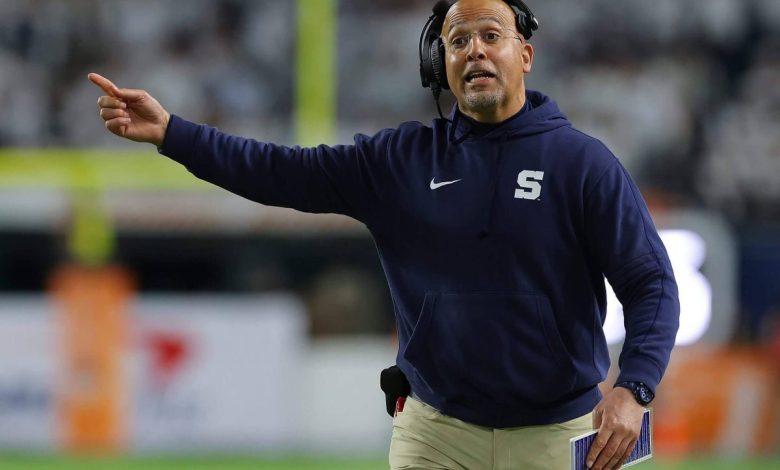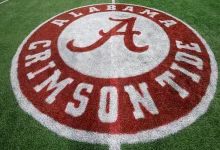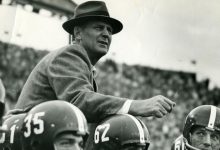Franklin, James? No, according to The Athletic, Brian Kelly is the biggest loser as Notre Dame advances to the CFP championship game.

The College Football Playoff (CFP) is a grand stage, a destination that every major college football program dreams of reaching. For Notre Dame, that dream has been realized, as the Fighting Irish find themselves advancing to the coveted CFP Championship Game. However, amidst this success, a notable storyline has emerged that not everyone expected: Brian Kelly, the former Notre Dame head coach, has become the “biggest loser” in this narrative, according to The Athletic. This may sound counterintuitive, as Kelly led Notre Dame to great heights before making a dramatic move to Louisiana State University (LSU). However, the interpretation of this label, when dissected thoroughly, speaks volumes about the competitive nature of college football and the expectations that come with coaching at top-tier programs.
In this article, we will explore why Brian Kelly, despite his success at LSU, is viewed as the biggest loser in this CFP storyline, and what this means for both him personally and for college football coaching at large. We will dive into the relationship between Kelly and Notre Dame, the complexities of his departure, and how Notre Dame’s rise to the national championship game plays into the larger conversation about coaching legacies and expectations.
The Notre Dame and Brian Kelly Relationship
Brian Kelly was the head coach of Notre Dame for 12 seasons, from 2010 to 2021, and under his leadership, the Fighting Irish experienced one of the most successful stretches in the program’s storied history. Kelly is arguably one of the most successful coaches in Notre Dame’s history, at least in the modern era. During his tenure, Kelly elevated the program back to national prominence, consistently recruiting top talent and competing in major bowl games. Perhaps most notably, Kelly led the Irish to the CFP in 2018 and 2020, though both appearances ended in disappointing losses, but this was still seen as an achievement.
However, despite the team’s success under Kelly, his departure from Notre Dame in 2021 for LSU raised many eyebrows. Kelly left Notre Dame in a somewhat controversial manner, announcing his move to LSU in the midst of recruiting season, with little warning and much surprise to the Notre Dame community. This move was seen by some as a betrayal, especially given Kelly’s previous statements about being committed to Notre Dame for the long haul.
While Kelly’s decision to leave for LSU was based on his desire to coach in the SEC, the most competitive conference in college football, the timing of his departure and the way it unfolded made it feel like a strategic career move more than a passion-driven decision. After all, LSU’s football program has a rich tradition, financial backing, and access to elite talent, making it an attractive destination for any coach seeking to prove themselves in one of the most competitive conferences in the country.
Yet, Kelly’s decision has not been without consequences. His departure left a huge void at Notre Dame, a program that prides itself on its history, academic integrity, and commitment to excellence. Replacing Kelly would not be an easy task, and his sudden exit put the program at a crossroads.
The Rise of Marcus Freeman and Notre Dame’s CFP Appearance
Enter Marcus Freeman, a former Notre Dame defensive coordinator, who was quickly elevated to the head coaching position following Kelly’s abrupt departure. Freeman, a young and highly respected defensive mind, was already a rising star in the college football coaching world before taking over as the head coach of Notre Dame.
When Freeman took the reins at Notre Dame, expectations were high but also tempered with uncertainty. Freeman had been with the team for just one season as a defensive coordinator, and while he had demonstrated great potential as a recruiter and motivator, leading the team as a head coach was a different challenge.
However, Notre Dame’s 2024 season has been nothing short of remarkable. Under Freeman’s leadership, the team has exceeded expectations, particularly given the relatively short period of time Freeman has had to establish his philosophy and culture within the program. The Irish’s path to the CFP Championship Game has included key victories, including a dominant win over some of the toughest competition in college football. Freeman’s leadership, paired with strong performances from standout players, has placed Notre Dame in a position to compete for a national title.
This success, though, highlights the irony of Brian Kelly’s departure. Kelly, who spent over a decade at Notre Dame trying to lead the team to a national championship, was unable to reach the pinnacle, despite coming close in 2018 and 2020. Yet, in just his second year, Freeman has guided the Irish to the ultimate stage, leaving Kelly to look on from the sidelines.
Brian Kelly’s Success at LSU and the Perception of His Departure
While Kelly has had success at LSU, there’s a growing perception that his departure from Notre Dame may have been premature or misguided in the grand scheme of things. Kelly did what many coaches aspire to do: he won the SEC West in his first season at LSU and has already made a major impact on the program. His success in Baton Rouge, combined with LSU’s rich football tradition, has bolstered his reputation in some circles.
However, the results at LSU are not without their own challenges. Despite finishing strong in 2023, LSU has faced significant setbacks throughout the 2024 season, including losses to some of the top SEC programs. Kelly’s team still struggles to consistently match up with the powerhouses of the SEC, and his place in the conference has yet to be fully solidified. Given the financial investment LSU has made in Kelly’s tenure, the pressure to produce national championships will only grow with time.
For Kelly, watching Notre Dame advance to the CFP Championship Game without him is a stark reminder of what he left behind. The Irish’s sudden resurgence in the post-Kelly era only serves to underline the fact that Notre Dame is still capable of reaching the highest heights, even without the man who was once at the helm. This situation places Kelly in a unique position: a coach who has achieved success, but who might now feel the sting of seeing his former program flourish without him.
Kelly’s Legacy: The Conflict of High Expectations
Kelly’s departure from Notre Dame was a moment of personal and professional ambition, but it also raised questions about legacy. He had set high expectations for himself at Notre Dame, and those expectations were amplified by the program’s history and traditions. While Kelly had a solid track record at Notre Dame, his inability to deliver a national championship was a mark against his tenure. After all, Notre Dame is a program that is synonymous with winning at the highest level, and the pressure to bring home a title is always present.
The fact that Notre Dame is now in the CFP Championship Game without him could be seen as a referendum on his inability to deliver the ultimate prize. For many, it serves as a reminder that programs are bigger than any one coach. Kelly’s departure from Notre Dame was a loss not just for the program, but for his legacy in college football.
What’s ironic about this situation is that Kelly has been incredibly successful in his own right, but his story now seems to be intertwined with the continued success of Notre Dame. If Freeman were to guide the Irish to a national championship, it would only highlight Kelly’s failures in achieving the same feat, despite spending years trying.
Reframing the “Biggest Loser” Narrative
At first glance, it might seem counterintuitive to label Brian Kelly as the biggest loser in this situation. After all, LSU is a prestigious program, and Kelly’s career is far from over. But there is an undeniable sense that Kelly’s departure from Notre Dame and the Irish’s subsequent success has created a narrative that will be difficult for him to escape.
Some would argue that Kelly’s decision to leave Notre Dame was based on his desire to prove himself in the SEC, the most competitive football conference in the country. But this ambition has come at a personal cost, and now that Notre Dame is playing for a national title in 2024, Kelly’s legacy is being scrutinized in a way that would have been unimaginable just a few years ago.
It’s also worth noting that Kelly’s story is part of a larger trend in college football, where coaches are often faced with enormous expectations and demands. In some cases, their success is measured not just by their on-field accomplishments, but by their ability to leave behind a legacy of championships, sustained success, and cultural impact. Kelly, for all his accomplishments, may find that his place in the history of college football is forever intertwined with Notre Dame’s success, particularly now that the program has advanced to the sport’s biggest stage without him.
.









